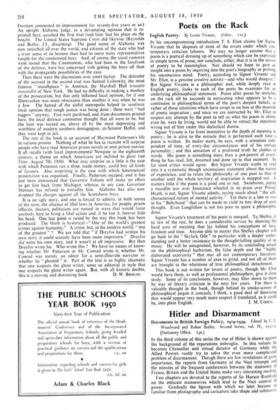Poets on the Rack
English Poetry. By Leone Vivante. (Faber. 2ts.)
IN his uncompromising introduction T. S. Eliot claims for Signor Vivante that he disposes of most of the errors under which con- temporary criticism labours. We may no longer assume that a poem is a poetical dressing up of something which can be expressed in simple terms of prose, nor conclude, either, that it is in the nature of poetry to be meaningless. Nor should we hope to gain an insight into a poem by inquiring into the poet's biography or probing his unconscious mind. Poetry, according to Signor Vivante and Mr. Eliot, is a genuine creative activity—and who would disagree ? But Signor Vivante is a philosopher and, while deeply read in English poetry, looks to each of the poets he examines for an underlying philosophical statement. Poem after poem he stretches on the rack till he succeeds in extricating what appears to be a confession in philosophical terms of the poet's, deepest beliefs, or rather of those intuitions which have swept in on him at the moment of poetic inspiration ; and since we are instructed by Mr. Eliot to suspect any attempt by the poet to tell us what his poem is about, even he, were he living, would not be able to retract the statement wrung out of him under this dialectical duress.
Signor Vivante is far from insensitive to the depth of meaning in poetry ; he is alive to the miracle that is performed each time a poem is written. Its maker starts, he says, with a sensation inde- pendent of time, of every-day circumstances and of his surface personality ; and this sensation of a profound truth he clothes in words. His poem is something more than a pot-pourrt of every- thing he has read, felt, dreamed and done up to that moment. So far most critics would agree. But Signor Vivante wants to read into it a systematic though unconscious statement about the nature of experience, and to relate the philosophy of one poet to that of another until the whole territory of inspiration is mapped out. It matters little if the poem is a good one or not. Swinburne, piping a maudlin tear over Innocence wheeled in its pram over Putney Heath, is not, Signor Vivante admits, saying much about " the self- characterised nature of mental activity." Yet there is a line or two in his " Babyhood " that can be made to yield its tiny drop of pure thought. Even Longfellow is not too poor to spare a philosophic dime.
Signor Vivante's treatment of his poets is unequal.. To Shelley, if to few of the rest, he does a considerable service by showing the hard core of meaning that lay behind his conceptions of love, freedom and time. Anyone able to master this Shelley chapter will go back to the " Skylark Ode " in particular with a deeper under- standing and a better resistance to the thought-lulling quality of its music. He will be antagonised, however, by its concluding attack on the philosophical barbarism, the false depth and the " highly elaborated exteriority " that mar all our contemporary literature. Signor Vivante has a number of axes to grind, and not all of them are brought to the whetstone of true philosophical detachment.
This book is not written for lovers of poetry, though Mr. Eliot would have them, as well as professional philosophers, give it close study. Some of its conclusions, however, may filter down to them by way of literary criticism in the next few years. For there is valuable thought in the book, though behind its smoke-screen of philosophical jargon it conceals, I think, a good deal of theorising that would appear very much more suspect if translated, as it could


































 Previous page
Previous page